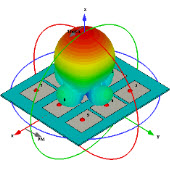求助!NS2中添加新的TCP Sink类后出错
invalid command name "Agent/TCPNCSink"
while executing
"Agent/TCPNCSink create _o92 "
invoked from within
"catch "$className create $o $args" msg"
invoked from within
"if [catch "$className create $o $args" msg] {
if [string match "__FAILED_SHADOW_OBJECT_" $msg] {
delete $o
return ""
}
global errorInfo
error "class $..."
(procedure "new" line 3)
invoked from within
"new Agent/TCPNCSink"
invoked from within
"set sink [new Agent/TCPNCSink]"
(file "simple-nc.tcl" line 53)
用NS指导书里面列出所有Agent的子类那个proc运行一下,也没有显示出新建的这个TCPNCSink。
我是不是少做了点啥?
谢谢!
贴代码
贴代码
代码如下:
//tcp-sink-nc.h
#ifndef ns_tcpncsink_h
#define ns_tcpncsink_h
#include <math.h>
#include "agent.h"
#include "tcp.h"
/* max window size */
// #define MWS 1024
#define MWS 64
#define MWM (MWS-1)
#define HS_MWS 65536
#define HS_MWM (MWS-1)
/* For Tahoe TCP, the "window" parameter, representing the receiver's
* advertised window, should be less than MWM. For Reno TCP, the
* "window" parameter should be less than MWM/2.
*/
class TcpNCSink;
class NCAcker {
public:
NCAcker();
virtual ~NCAcker() { delete[] seen_; }
void update_ts(int seqno, double ts, int rfc1323 = 0);
int update(int seqno, int numBytes);
void update_ecn_unacked(int value);
inline int Seqno() const { return (next_ - 1); }
virtual void append_ack(hdr_cmn*, hdr_tcp*, int oldSeqno) const;
void reset();
double ts_to_echo() { return ts_to_echo_;}
int ecn_unacked() { return ecn_unacked_;}
inline int Maxseen() const { return (maxseen_); }
void resize_buffers(int sz); // resize the seen_ buffer
protected:
int next_; /* next packet expected */
int maxseen_; /* max packet number seen */
int wndmask_; /* window mask - either MWM or HS_MWM - Sylvia */
int ecn_unacked_; /* ECN forwarded to sender, but not yet
* acknowledged. */
int *seen_; /* array of packets seen */
double ts_to_echo_; /* timestamp to echo to peer */
int is_dup_; // A duplicate packet.
public:
int last_ack_sent_; // For updating timestamps, from Andrei Gurtov.
};
// derive Sacker from TclObject to allow for traced variable
class NCSackStack;
class NCSacker : public NCAcker, public TclObject {
public:
NCSacker() : base_nblocks_(-1), sf_(0) { };
~NCSacker();
void append_ack(hdr_cmn*, hdr_tcp*, int oldSeqno) const;
void reset();
void configure(TcpNCSink*);
protected:
int base_nblocks_;
int* dsacks_; // Generate DSACK blocks.
NCSackStack *sf_;
void trace(TracedVar*);
};
class TcpNCSink : public Agent {
friend class XcpSink;
public:
TcpNCSink(NCAcker*);
void recv(Packet* pkt, Handler*);
void reset();
int command(int argc, const char*const* argv);
TracedInt& maxsackblocks() { return max_sack_blocks_; }
protected:
void ack(Packet*);
virtual void add_to_ack(Packet* pkt);
virtual void delay_bind_init_all();
virtual int delay_bind_dispatch(const char *varName, const char *localName, TclObject *tracer);
NCAcker* acker_;
int ts_echo_bugfix_;
int ts_echo_rfc1323_; // conforms to rfc1323 for timestamps echo
// Added by Andrei Gurtov
friend void NCSacker::configure(TcpNCSink*);
TracedInt max_sack_blocks_; /* used only by sack sinks */
Packet* save_; /* place to stash saved packet while delaying */
/* used by DelAckSink */
int generate_dsacks_; // used only by sack sinks
int qs_enabled_; // to enable QuickStart
int RFC2581_immediate_ack_; // Used to generate ACKs immediately
int bytes_; // for JOBS
// for RFC2581-compliant gap-filling.
double lastreset_; /* W.N. used for detecting packets */
/* from previous incarnations */
int ecn_syn_; /* allow SYN/ACK packets to be ECN-capable */
};
class NCDelAckSink;
class NCDelayTimer : public TimerHandler {
public:
NCDelayTimer(NCDelAckSink *a) : TimerHandler() { a_ = a; }
protected:
virtual void expire(Event *e);
NCDelAckSink *a_;
};
class NCDelAckSink : public TcpNCSink {
public:
NCDelAckSink(NCAcker* acker);
void recv(Packet* pkt, Handler*);
virtual void timeout(int tno);
void reset();
protected:
double interval_;
NCDelayTimer delay_timer_;
};
#endif
--------------------分割线-----------------------------------
//tcp-sink-nc.cc
#include "flags.h"
#include "ip.h"
#include "tcp-sink-nc.h"
#include "hdr_qs.h"
static class TcpNCSinkClass : public TclClass {
public:
TcpNCSinkClass() : TclClass("Agent/TCPNCSink") {}
TclObject* create(int, const char*const*) {
return (new TcpNCSink(new NCAcker));
}
} class_tcpncsink;
NCAcker::NCAcker() : next_(0), maxseen_(0), wndmask_(MWM), ecn_unacked_(0),
ts_to_echo_(0), last_ack_sent_(0)
{
seen_ = new int[MWS];
memset(seen_, 0, (sizeof(int) * (MWS)));
}
void NCAcker::reset()
{
next_ = 0;
maxseen_ = 0;
memset(seen_, 0, (sizeof(int) * (wndmask_ + 1)));
}
// dynamically increase the seen buffer as needed
// size must be a factor of two for the wndmask_ to work...
void NCAcker::resize_buffers(int sz) {
int* new_seen = new int[sz];
int new_wndmask = sz - 1;
if(!new_seen){
fprintf(stderr, "Unable to allocate buffer seen_[%i]\n", sz);
exit(1);
}
memset(new_seen, 0, (sizeof(int) * (sz)));
for(int i = next_; i <= maxseen_+1; i++){
new_seen[i & new_wndmask] = seen_[i&wndmask_];
}
delete[] seen_;
seen_ = new_seen;
wndmask_ = new_wndmask;
return;
}
void NCAcker::update_ts(int seqno, double ts, int rfc1323)
{
// update timestamp if segment advances with ACK.
// Code changed by Andrei Gurtov.
if (rfc1323 && seqno == last_ack_sent_ + 1)
ts_to_echo_ = ts;
else if (ts >= ts_to_echo_ && seqno <= last_ack_sent_ + 1)
//rfc1323-bis, update timestamps from duplicate segments
ts_to_echo_ = ts;
}
// returns number of bytes that can be "delivered" to application
// also updates the receive window (i.e. next_, maxseen, and seen_ array)
int NCAcker::update(int seq, int numBytes)
{
bool just_marked_as_seen = FALSE;
is_dup_ = FALSE;
// start by assuming the segment hasn't been received before
if (numBytes <= 0)
printf("Error, received TCP packet size <= 0\n");
int numToDeliver = 0;
while(seq + 1 - next_ >= wndmask_) {
// next_ is next packet expected; wndmask_ is the maximum
// window size minus 1; if somehow the seqno of the
// packet is greater than the one we're expecting+wndmask_,
// then resize the buffer.
resize_buffers((wndmask_+1)*2);
}
if (seq > maxseen_) {
// the packet is the highest one we've seen so far
int i;
for (i = maxseen_ + 1; i < seq; ++i)
seen_[i & wndmask_] = 0;
// we record the packets between the old maximum and
// the new max as being "unseen" i.e. 0 bytes of each
// packet have been received
maxseen_ = seq;
seen_[maxseen_ & wndmask_] = numBytes;
// store how many bytes have been seen for this packet
seen_[(maxseen_ + 1) & wndmask_] = 0;
// clear the array entry for the packet immediately
// after this one
just_marked_as_seen = TRUE;
// necessary so this packet isn't confused as being a duplicate
}
int next = next_;
if (seq < next) {
// Duplicate packet case 1: the packet is to the left edge of
// the receive window; therefore we must have seen it
// before
#ifdef DEBUGDSACK
printf("%f\t Received duplicate packet %d\n",Scheduler::instance().clock(),seq);
#endif
is_dup_ = TRUE;
}
if (seq >= next && seq <= maxseen_) {
// next is the left edge of the recv window; maxseen_
// is the right edge; execute this block if there are
// missing packets in the recv window AND if current
// packet falls within those gaps
if (seen_[seq & wndmask_] && !just_marked_as_seen) {
// Duplicate case 2: the segment has already been
// recorded as being received (AND not because we just
// marked it as such)
is_dup_ = TRUE;
#ifdef DEBUGDSACK
printf("%f\t Received duplicate packet %d\n",Scheduler::instance().clock(),seq);
#endif
}
seen_[seq & wndmask_] = numBytes;
// record the packet as being seen
while (seen_[next & wndmask_]) {
// this loop first gets executed if seq==next;
// i.e., this is the next packet in order that
// we've been waiting for. the loop sets how
// many bytes we can now deliver to the
// application, due to this packet arriving
// (and the prior arrival of any segments
// immediately to the right)
numToDeliver += seen_[next & wndmask_];
++next;
}
next_ = next;
// store the new left edge of the window
}
return numToDeliver;
}
TcpNCSink::TcpNCSink(NCAcker* acker) : Agent(PT_ACK), acker_(acker), save_(NULL),
lastreset_(0.0)
{
bytes_ = 0;
bind("bytes_", &bytes_);
/*
* maxSackBlocks_ does wierd tracing things.
* don't make it delay-bound yet.
*/
#if defined(TCP_DELAY_BIND_ALL) && 0
#else /* ! TCP_DELAY_BIND_ALL */
bind("maxSackBlocks_", &max_sack_blocks_); // used only by sack
#endif /* TCP_DELAY_BIND_ALL */
}
void
TcpNCSink::delay_bind_init_all()
{
delay_bind_init_one("packetSize_");
delay_bind_init_one("ts_echo_bugfix_");
delay_bind_init_one("ts_echo_rfc1323_");
delay_bind_init_one("bytes_"); // For throughput measurements in JOBS
delay_bind_init_one("generateDSacks_"); // used only by sack
delay_bind_init_one("qs_enabled_");
delay_bind_init_one("RFC2581_immediate_ack_");
delay_bind_init_one("ecn_syn_");
#if defined(TCP_DELAY_BIND_ALL) && 0
delay_bind_init_one("maxSackBlocks_");
#endif /* TCP_DELAY_BIND_ALL */
Agent::delay_bind_init_all();
}
int
TcpNCSink::delay_bind_dispatch(const char *varName, const char *localName, TclObject *tracer)
{
if (delay_bind(varName, localName, "packetSize_", &size_, tracer)) return TCL_OK;
if (delay_bind_bool(varName, localName, "ts_echo_bugfix_", &ts_echo_bugfix_, tracer)) return TCL_OK;
if (delay_bind_bool(varName, localName, "ts_echo_rfc1323_", &ts_echo_rfc1323_, tracer)) return TCL_OK;
if (delay_bind_bool(varName, localName, "generateDSacks_", &generate_dsacks_, tracer)) return TCL_OK;
if (delay_bind_bool(varName, localName, "qs_enabled_", &qs_enabled_, tracer)) return TCL_OK;
if (delay_bind_bool(varName, localName, "RFC2581_immediate_ack_", &RFC2581_immediate_ack_, tracer)) return TCL_OK;
if (delay_bind_bool(varName, localName, "ecn_syn_", &ecn_syn_ ,tracer)) return TCL_OK;
#if defined(TCP_DELAY_BIND_ALL) && 0
if (delay_bind(varName, localName, "maxSackBlocks_", &max_sack_blocks_, tracer)) return TCL_OK;
#endif /* TCP_DELAY_BIND_ALL */
return Agent::delay_bind_dispatch(varName, localName, tracer);
}
void NCAcker::append_ack(hdr_cmn*, hdr_tcp*, int) const
{
}
void NCAcker::update_ecn_unacked(int value)
{
ecn_unacked_ = value;
}
int TcpNCSink::command(int argc, const char*const* argv)
{
if (argc == 2) {
if (strcmp(argv[1], "reset") == 0) {
reset();
return (TCL_OK);
}
if (strcmp(argv[1], "resize_buffers") == 0) {
// no need for this as seen buffer set dynamically
fprintf(stderr,"DEPRECIATED: resize_buffers\n");
return (TCL_OK);
}
}
return (Agent::command(argc, argv));
}
void TcpNCSink::reset()
{
acker_->reset();
save_ = NULL;
lastreset_ = Scheduler::instance().clock(); /* W.N. - for detecting */
/* packets from previous incarnations */
}
void TcpNCSink::ack(Packet* opkt)
{
Packet* npkt = allocpkt();
// opkt is the "old" packet that was received
// npkt is the "new" packet being constructed (for the ACK)
double now = Scheduler::instance().clock();
hdr_tcp *otcp = hdr_tcp::access(opkt);
hdr_ip *oiph = hdr_ip::access(opkt);
hdr_tcp *ntcp = hdr_tcp::access(npkt);
if (qs_enabled_) {
// QuickStart code from Srikanth Sundarrajan.
hdr_qs *oqsh = hdr_qs::access(opkt);
hdr_qs *nqsh = hdr_qs::access(npkt);
if (otcp->seqno() == 0 && oqsh->flag() == QS_REQUEST) {
nqsh->flag() = QS_RESPONSE;
nqsh->ttl() = (oiph->ttl() - oqsh->ttl()) % 256;
nqsh->rate() = oqsh->rate();
}
else {
nqsh->flag() = QS_DISABLE;
}
}
// get the tcp headers
ntcp->seqno() = acker_->Seqno();
// get the cumulative sequence number to put in the ACK; this
// is just the left edge of the receive window - 1
ntcp->ts() = now;
// timestamp the packet
if (ts_echo_bugfix_) /* TCP/IP Illustrated, Vol. 2, pg. 870 */
ntcp->ts_echo() = acker_->ts_to_echo();
else
ntcp->ts_echo() = otcp->ts();
// echo the original's time stamp
hdr_ip* oip = hdr_ip::access(opkt);
hdr_ip* nip = hdr_ip::access(npkt);
// get the ip headers
nip->flowid() = oip->flowid();
// copy the flow id
hdr_flags* of = hdr_flags::access(opkt);
hdr_flags* nf = hdr_flags::access(npkt);
hdr_flags* sf;
if (save_ != NULL)
sf = hdr_flags::access(save_);
else
sf = 0;
// Look at delayed packet being acked.
if ( (sf != 0 && sf->cong_action()) || of->cong_action() )
// Sender has responsed to congestion.
acker_->update_ecn_unacked(0);
if ( (sf != 0 && sf->ect() && sf->ce()) ||
(of->ect() && of->ce()) )
// New report of congestion.
acker_->update_ecn_unacked(1);
if ( (sf != 0 && sf->ect()) || of->ect() )
// Set EcnEcho bit.
nf->ecnecho() = acker_->ecn_unacked();
if (!of->ect() && of->ecnecho() ||
(sf != 0 && !sf->ect() && sf->ecnecho()) ) {
// This is the negotiation for ECN-capability.
// We are not checking for of->cong_action() also.
// In this respect, this does not conform to the
// specifications in the internet draft
nf->ecnecho() = 1;
if (ecn_syn_)
nf->ect() = 1;
}
acker_->append_ack(hdr_cmn::access(npkt),
ntcp, otcp->seqno());
add_to_ack(npkt);
// the above function is used in TcpAsymSink
// Andrei Gurtov
acker_->last_ack_sent_ = ntcp->seqno();
// printf("ACK %d ts %f\n", ntcp->seqno(), ntcp->ts_echo());
send(npkt, 0);
// send it
}
void TcpNCSink::add_to_ack(Packet*)
{
return;
}
void TcpNCSink::recv(Packet* pkt, Handler*)
{
int numToDeliver;
int numBytes = hdr_cmn::access(pkt)->size();
// number of bytes in the packet just received
hdr_tcp *th = hdr_tcp::access(pkt);
/* W.N. Check if packet is from previous incarnation */
if (th->ts() < lastreset_) {
// Remove packet and do nothing
Packet::free(pkt);
return;
}
acker_->update_ts(th->seqno(),th->ts(),ts_echo_rfc1323_);
// update the timestamp to echo
numToDeliver = acker_->update(th->seqno(), numBytes);
// update the recv window; figure out how many in-order-bytes
// (if any) can be removed from the window and handed to the
// application
if (numToDeliver) {
bytes_ += numToDeliver;
recvBytes(numToDeliver);
}
// send any packets to the application
ack(pkt);
// ACK the packet
Packet::free(pkt);
// remove it from the system
}
static class NCDelSinkClass : public TclClass {
public:
NCDelSinkClass() : TclClass("Agent/TCPNCSink/NCDelAck") {}
TclObject* create(int, const char*const*) {
return (new NCDelAckSink(new NCAcker));
}
} class_ncdelsink;
NCDelAckSink::NCDelAckSink(NCAcker* acker) : TcpNCSink(acker), delay_timer_(this)
{
bind_time("interval_", &interval_);
// Deleted the line below, since this is bound in TcpSink.
// bind("bytes_", &bytes_); // useby JOBS
}
void NCDelAckSink::reset() {
if (delay_timer_.status() == TIMER_PENDING)
delay_timer_.cancel();
TcpNCSink::reset();
}
void NCDelAckSink::recv(Packet* pkt, Handler*)
{
int numToDeliver;
int numBytes = hdr_cmn::access(pkt)->size();
hdr_tcp *th = hdr_tcp::access(pkt);
/* W.N. Check if packet is from previous incarnation */
if (th->ts() < lastreset_) {
// Remove packet and do nothing
Packet::free(pkt);
return;
}
acker_->update_ts(th->seqno(),th->ts(),ts_echo_rfc1323_);
numToDeliver = acker_->update(th->seqno(), numBytes);
if (numToDeliver) {
bytes_ += numToDeliver; // for JOBS
recvBytes(numToDeliver);
}
// If there's no timer and the packet is in sequence, set a timer.
// Otherwise, send the ack and update the timer.
if (delay_timer_.status() != TIMER_PENDING &&
th->seqno() == acker_->Seqno()) {
// There's no timer, so we can set one and choose
// to delay this ack.
// If we're following RFC2581 (section 4.2) exactly,
// we should only delay the ACK if we're know we're
// not doing recovery, i.e. not gap-filling.
// Since this is a change to previous ns behaviour,
// it's controlled by an optional bound flag.
// discussed April 2000 in the ns-users list archives.
if (RFC2581_immediate_ack_ &&
(th->seqno() < acker_->Maxseen())) {
// don't delay the ACK since
// we're filling in a gap
} else {
// delay the ACK and start the timer.
save_ = pkt;
delay_timer_.resched(interval_);
return;
}
}
// If there was a timer, turn it off.
if (delay_timer_.status() == TIMER_PENDING)
delay_timer_.cancel();
ack(pkt);
if (save_ != NULL) {
Packet::free(save_);
save_ = NULL;
}
Packet::free(pkt);
}
void NCDelAckSink::timeout(int)
{
// The timer expired so we ACK the last packet seen.
if ( save_ != NULL ) {
Packet* pkt = save_;
ack(pkt);
save_ = NULL;
Packet::free(pkt);
}
}
void NCDelayTimer::expire(Event* /*e*/) {
a_->timeout(0);
}
/* "sack1-tcp-sink" is for Matt and Jamshid's implementation of sack. */
class NCSackStack {
protected:
int size_;
int cnt_;
struct Sf_Entry {
int left_;
int right_;
} *SFE_;
public:
NCSackStack(int); // create a SackStack of size (int)
~NCSackStack();
int& head_right(int n = 0) { return SFE_[n].right_; }
int& head_left(int n = 0) { return SFE_[n].left_; }
int cnt() { return cnt_; } // how big is the stack
void reset() {
register int i;
for (i = 0; i < cnt_; i++)
SFE_[i].left_ = SFE_[i].right_ = -1;
cnt_ = 0;
}
inline void push(int n = 0) {
if (cnt_ >= size_) cnt_ = size_ - 1; // overflow check
register int i;
for (i = cnt_-1; i >= n; i--)
SFE_[i+1] = SFE_[i]; // not efficient for big size
cnt_++;
}
inline void pop(int n = 0) {
register int i;
for (i = n; i < cnt_-1; i++)
SFE_[i] = SFE_[i+1]; // not efficient for big size
SFE_[i].left_ = SFE_[i].right_ = -1;
cnt_--;
}
};
NCSackStack::NCSackStack(int sz)
{
register int i;
size_ = sz;
SFE_ = new Sf_Entry[sz];
for (i = 0; i < sz; i++)
SFE_[i].left_ = SFE_[i].right_ = -1;
cnt_ = 0;
}
NCSackStack::~NCSackStack()
{
delete SFE_;
}
static class NCSack1TcpSinkClass : public TclClass {
public:
NCSack1TcpSinkClass() : TclClass("Agent/TCPNCSink/NCSack1") {}
TclObject* create(int, const char*const*) {
NCSacker* sacker = new NCSacker;
TcpNCSink* sink = new TcpNCSink(sacker);
sacker->configure(sink);
return (sink);
}
} class_ncsack1tcpsink;
static class NCSack1DelAckTcpSinkClass : public TclClass {
public:
NCSack1DelAckTcpSinkClass() : TclClass("Agent/TCPNCSink/NCSack1/NCDelAck") {}
TclObject* create(int, const char*const*) {
NCSacker* sacker = new NCSacker;
TcpNCSink* sink = new NCDelAckSink(sacker);
sacker->configure(sink);
return (sink);
}
} class_ncsack1delacktcpsink;
void NCSacker::configure(TcpNCSink *sink)
{
if (sink == NULL) {
fprintf(stderr, "warning: NCSacker::configure(): no TCP NC sink!\n");
return;
}
TracedInt& nblocks = sink->max_sack_blocks_;
if (int(nblocks) > NSA) {
fprintf(stderr, "warning(NCSacker::configure): TCP header limits number of SACK blocks to %d, not %d\n", NSA, int(nblocks));
nblocks = NSA;
}
sf_ = new NCSackStack(int(nblocks));
nblocks.tracer(this);
base_nblocks_ = int(nblocks);
dsacks_ = &(sink->generate_dsacks_);
}
void
NCSacker::trace(TracedVar *v)
{
// we come here if "nblocks" changed
TracedInt* ti = (TracedInt*) v;
if (int(*ti) > NSA) {
fprintf(stderr, "warning(NCSacker::trace): TCP header limits number of SACK blocks to %d, not %d\n", NSA, int(*ti));
*ti = NSA;
}
int newval = int(*ti);
delete sf_;
sf_ = new NCSackStack(newval);
base_nblocks_ = newval;
}
void NCSacker::reset()
{
sf_->reset();
NCAcker::reset();
}
NCSacker::~NCSacker()
{
delete sf_;
}
void NCSacker::append_ack(hdr_cmn* ch, hdr_tcp* h, int old_seqno) const
{
// ch and h are the common and tcp headers of the Ack being constructed
// old_seqno is the sequence # of the packet we just got
int sack_index, i, sack_right, sack_left;
int recent_sack_left, recent_sack_right;
int seqno = Seqno();
// the last in-order packet seen (i.e. the cumulative ACK # - 1)
sack_index = 0;
sack_left = sack_right = -1;
// initialization; sack_index=0 and sack_{left,right}= -1
if (old_seqno < 0) {
printf("Error: invalid packet number %d\n", old_seqno);
} else if (seqno >= maxseen_ && (sf_->cnt() != 0))
sf_->reset();
// if the Cumulative ACK seqno is at or beyond the right edge
// of the window, and if the SackStack is not empty, reset it
// (empty it)
else if (( (seqno < maxseen_) || is_dup_ ) && (base_nblocks_ > 0)) {
// Otherwise, if the received packet is to the left of
// the right edge of the receive window (but not at
// the right edge), OR if it is a duplicate, AND we
// can have 1 or more Sack blocks, then execute the
// following, which computes the most recent Sack
// block
if ((*dsacks_) && is_dup_) {
// Record the DSACK Block
h->sa_left(sack_index) = old_seqno;
h->sa_right(sack_index) = old_seqno+1;
// record the block
sack_index++;
#ifdef DEBUGDSACK
printf("%f\t Generating D-SACK for packet %d\n", Scheduler::instance().clock(),old_seqno);
#endif
}
// Build FIRST (traditional) SACK block
// If we already had a DSACK block due to a duplicate
// packet, and if that duplicate packet is in the
// receiver's window (i.e. the packet's sequence
// number is > than the cumulative ACK) then the
// following should find the SACK block it's a subset
// of. If it's <= cum ACK field then the following
// shouldn't record a superset SACK block for it.
if (sack_index >= base_nblocks_) {
printf("Error: can't use DSACK with less than 2 SACK blocks\n");
} else {
sack_right=-1;
// look rightward for first hole
// start at the current packet
for (i=old_seqno; i<=maxseen_; i++) {
if (!seen_[i & wndmask_]) {
sack_right=i;
break;
}
}
// if there's no hole set the right edge of the sack
// to be the next expected packet
if (sack_right == -1) {
sack_right = maxseen_+1;
}
// if the current packet's seqno is smaller than the
// left edge of the window, set the sack_left to 0
if (old_seqno <= seqno) {
sack_left = 0;
// don't record/send the block
} else {
// look leftward from right edge for first hole
for (i = sack_right-1; i > seqno; i--) {
if (!seen_[i & wndmask_]) {
sack_left = i+1;
break;
}
}
h->sa_left(sack_index) = sack_left;
h->sa_right(sack_index) = sack_right;
// printf("pkt_seqno: %i cuml_seqno: %i sa_idx: %i sa_left: %i sa_right: %i\n" ,old_seqno, seqno, sack_index, sack_left, sack_right);
// record the block
sack_index++;
}
recent_sack_left = sack_left;
recent_sack_right = sack_right;
// first sack block is built, check the others
// make sure that if max_sack_blocks has been made
// large from tcl we don't over-run the stuff we
// allocated in Sacker::Sacker()
int k = 0;
while (sack_index < base_nblocks_) {
sack_left = sf_->head_left(k);
sack_right = sf_->head_right(k);
// no more history
if (sack_left < 0 || sack_right < 0 ||
sack_right > maxseen_ + 1)
break;
// newest ack "covers up" this one
if (recent_sack_left <= sack_left &&
recent_sack_right >= sack_right) {
sf_->pop(k);
continue;
}
h->sa_left(sack_index) = sack_left;
h->sa_right(sack_index) = sack_right;
// printf("pkt_seqno: %i cuml_seqno: %i sa_idx: %i sa_left: %i sa_right: %i\n" ,old_seqno, seqno, sack_index, sack_left, sack_right);
// store the old sack (i.e. move it down one)
sack_index++;
k++;
}
if (old_seqno > seqno) {
/* put most recent block onto stack */
sf_->push();
// this just moves things down 1 from the
// beginning, but it doesn't push any values
// on the stack
sf_->head_left() = recent_sack_left;
sf_->head_right() = recent_sack_right;
// this part stores the left/right values at
// the top of the stack (slot 0)
}
} // this '}' is for the DSACK base_nblocks_ >= test;
// (didn't feel like re-indenting all the code and
// causing a large diff)
}
h->sa_length() = sack_index;
// set the Length of the sack stack in the header
ch->size() += sack_index * 8;
// change the size of the common header to account for the
// Sack strings (2 4-byte words for each element)
}
----------------------------分割线-----------------------------------
//tcp-asym-sink-nc.cc
#ifndef lint
static const char rcsid[] =
"@(#) $Header: /cvsroot/nsnam/ns-2/tcp/tcp-asym-sink.cc,v 1.17 2003/08/14 04:26:42 sfloyd Exp $ (UCB)";
#endif
#include "template.h"
#include "flags.h"
#include "tcp-sink-nc.h"
#include "tcp-asym.h"
class TcpNCAsymSink : public NCDelAckSink {
public:
TcpNCAsymSink(NCAcker*);
virtual void recv(Packet* pkt, Handler* h);
virtual void timeout(int tno);
protected:
virtual void add_to_ack(Packet* pkt);
int delackcount_; /* the number of consecutive packets that have
not been acked yet */
int maxdelack_; /* the maximum extent to which acks can be
delayed */
int delackfactor_; /* the dynamically varying limit on the extent
to which acks can be delayed */
int delacklim_; /* limit on the extent of del ack based on the
sender's window */
double ts_ecn_; /* the time when an ECN was received last */
double ts_decrease_; /* the time when delackfactor_ was decreased last */
double highest_ts_echo_;/* the highest timestamp echoed by the peer */
};
static class TcpNCAsymSinkClass : public TclClass {
public:
TcpNCAsymSinkClass() : TclClass("Agent/TCPNCSink/Asym") {}
TclObject* create(int, const char*const*) {
return (new TcpNCAsymSink(new NCAcker));
}
} class_tcp_nc_asymsink;
TcpNCAsymSink::TcpNCAsymSink(NCAcker* acker) : NCDelAckSink(acker), delackcount_(0),
delackfactor_(1), delacklim_(0), ts_ecn_(0), ts_decrease_(0)
{
bind("maxdelack_", &maxdelack_);
}
/* Add fields to the ack. Not needed? */
void TcpNCAsymSink::add_to_ack(Packet* pkt)
{
hdr_tcpasym *tha = hdr_tcpasym::access(pkt);
tha->ackcount() = delackcount_;
}
void TcpNCAsymSink::recv(Packet* pkt, Handler*)
{
int olddelackfactor = delackfactor_;
int olddelacklim = delacklim_;
int max_sender_can_send = 0;
hdr_flags *fh = hdr_flags::access(pkt);
hdr_tcp *th = hdr_tcp::access(pkt);
hdr_tcpasym *tha = hdr_tcpasym::access(pkt);
double now = Scheduler::instance().clock();
int numBytes = hdr_cmn::access(pkt)->size();
acker_->update_ts(th->seqno(),th->ts(),ts_echo_rfc1323_);
acker_->update(th->seqno(), numBytes);
#if 0 // johnh
int numToDeliver;
/* XXX if the #if 0 is removed, delete the call to acker_->update() above */
numToDeliver = acker_->update(th->seqno(), numBytes);
if (numToDeliver)
recvBytes(numToDeliver);
#endif /* 0 */
/* determine the highest timestamp the sender has echoed */
highest_ts_echo_ = max(highest_ts_echo_, th->ts_echo());
/*
* if we receive an ECN and haven't received one in the past
* round-trip, double delackfactor_ (and consequently halve
* the frequency of acks) subject to a maximum
*/
if (fh->ecnecho() && highest_ts_echo_ >= ts_ecn_) {
delackfactor_ = min(2*delackfactor_, maxdelack_);
ts_ecn_ = now;
}
/*
* else if we haven't received an ECN in the past round trip and
* haven't (linearly) decreased delackfactor_ in the past round
* trip, we decrease delackfactor_ by 1 (and consequently increase
* the frequency of acks) subject to a minimum
*/
else if (highest_ts_echo_ >= ts_ecn_ && highest_ts_echo_ >= ts_decrease_) {
delackfactor_ = max(delackfactor_ - 1, 1);
ts_decrease_ = now;
}
/*
* if this is the next packet in sequence, we can consider delaying the ack.
* Set delacklim_ based on how much data the sender can send if we don't
* send back any more acks. The idea is to avoid stalling the sender because
* of a lack of acks.
*/
if (th->seqno() == acker_->Seqno()) {
max_sender_can_send = (int) min(tha->win()+acker_->Seqno()-tha->highest_ack(), tha->max_left_to_send());
/* XXXX we use a safety factor 2 */
delacklim_ = min(maxdelack_, max_sender_can_send/2);
}
else
delacklim_ = 0;
if (delackfactor_ < delacklim_)
delacklim_ = delackfactor_;
/*
* Log values of variables of interest. Since this is the only place
* where this is done, we decided against using a more general method
* as used for logging TCP sender state variables.
*/
if (channel_ && (olddelackfactor != delackfactor_ || olddelacklim != delacklim_)) {
char wrk[500];
int n;
/* we print src and dst in reverse order to conform to sender side */
sprintf(wrk, "time: %-6.3f saddr: %-2d sport: %-2d daddr:"
" %-2d dport: %-2d dafactor: %2d dalim: %2d max_scs:"
" %4d win: %4d\n", now, addr(), port(),
daddr(), dport(), delackfactor_,
delacklim_,max_sender_can_send, tha->win());
n = strlen(wrk);
wrk[n] = '\n';
wrk[n+1] = 0;
(void)Tcl_Write(channel_, wrk, n+1);
wrk[n] = 0;
}
delackcount_++;
/* check if we have waited long enough that we should send an ack */
if (delackcount_ < delacklim_) { /* it is not yet time to send an ack */
/* if the delayed ack timer is not set, set it now */
if (!(delay_timer_.status() == TIMER_PENDING)) {
save_ = pkt;
delay_timer_.resched(interval_);
}
else {
hdr_tcp *sth = hdr_tcp::access(save_);
/* save the pkt with the more recent timestamp */
if (th->ts() > sth->ts()) {
Packet::free(save_);
save_ = pkt;
}
}
return;
}
else { /* send back an ack now */
if (delay_timer_.status() == TIMER_PENDING) {
delay_timer_.cancel();
Packet::free(save_);
save_ = 0;
}
hdr_flags* hf = hdr_flags::access(pkt);
hf->ect() = 1;
ack(pkt);
delackcount_ = 0;
Packet::free(pkt);
}
}
void TcpNCAsymSink::timeout(int /*tno*/)
{
/*
* The timer expired so we ACK the last packet seen.
*/
Packet* pkt = save_;
delackcount_ = 0;
ack(pkt);
save_ = 0;
Packet::free(pkt);
}
-------------------------------分割线----------------------------------
上面三个文件是我新建的。基本上就是把原有的TCPSink相关文件复制了一遍,改了类的名字,除此以外在tcl/lib文件夹里面ns-default.tcl添加了
Agent/TCPNCSink set accessible_var_ true
Agent/TCPNCSink set sport_ 0
Agent/TCPNCSink set dport_ 0
#XXX other kinds of sinks -> should reparent
Agent/TCPNCSink set packetSize_ 40
Agent/TCPNCSink set maxSackBlocks_ 3
Agent/TCPNCSink set ts_echo_bugfix_ true ; # default changed, 2003/8/13
Agent/TCPNCSink set ts_echo_rfc1323_ false ; # default added, 2003/8/13
Agent/TCPNCSink set generateDSacks_ false
Agent/TCPNCSink set qs_enabled_ false
Agent/TCPNCSink set RFC2581_immediate_ack_ true
Agent/TCPNCSink set bytes_ 0
Agent/TCPNCSink set ecn_syn_ false ; # Added 2005/11/21 for SYN/ACK pkts.
Agent/TCPNCSink/NCDelAck set interval_ 100ms
catch {
Agent/TCPNCSink/Asym set interval_ 100ms
Agent/TCPNCSink/Asym set maxdelack_ 5
}
Agent/TCPNCSink/NCSack1/NCDelAck set interval_ 100ms
---------------------------------------
在ns-agent.tcl里添加了:
Agent/TCPNCSink instproc init {} {
eval $self next
set ns [Simulator instance]
$ns create-eventtrace Event $self
}
-----------------------------------
还修改了makefile。
但是编译通过,却没有生成新的类。
这是怎么回事?
到底是出错了呢,还是完成后没有生成你要的obj?
如果是后者,你看看console里的make输出,有没有CC tcp-sink-nc.cxx之类的字样。
Just run " make install ", after you run "make".
Also, maybe you should declare the default value of all the Otcl
variables of your *.cc file in /ns/tcl/lib/ns-default.tcl, this
will keep away from some ugly warnings.
看不出问题,可能你的ns并没有调用新编译的那个,因为make之后的文件是
放在当前目录。。。
我猜平常你应该直接 ns 。。。这样的,那就是这个问题。
因为如果你没有成功编译agent的话,那些在ns-default.tcl中的命令
会无法运行,并且错误会在你的脚本执行以前就出现。但是你这里没有
估计是你把可执行文件搞错了
问题解决了:
make clean
make depend
make
make install
都执行一遍才行
...
果然你调用了老版的ns
install就是要把ns的执行文件放到系统的某个目录中,这个目录在path环境变量
里。所以你要make install
相关文章:
- 关于元用电磁波能量给通信设备电池充电的新的见解和设计步骤(05-08)
- 哪里能下到最新的WAp协议?(05-08)
- 新的通信介质(05-08)
- 好像ns最新的官方manual里面引用的代码还是很久以前的(05-08)
- 从哪里可以下载到最新的802.11的draft?(05-08)
- 3G,4G会不会带来新的传输协议?(05-08)











